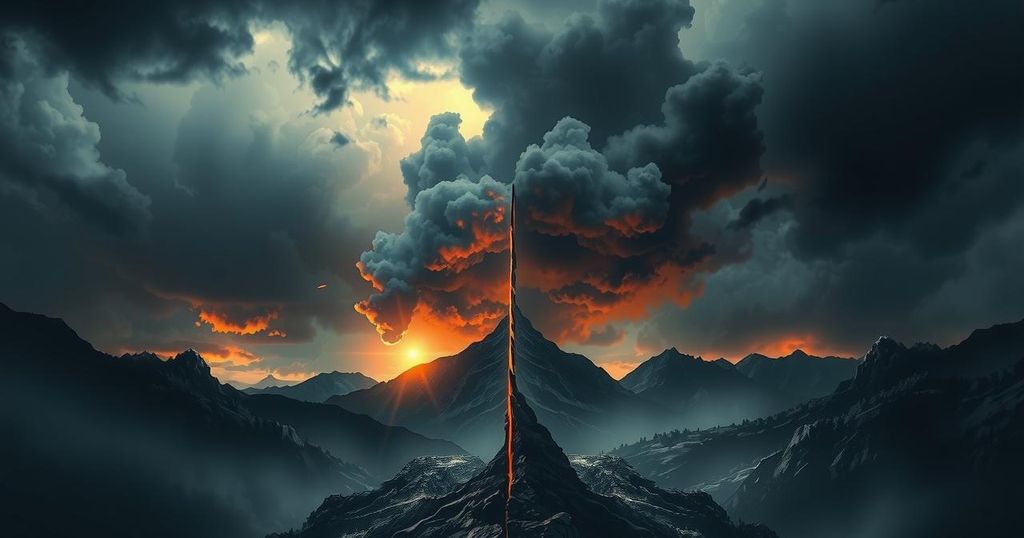World news
AFC, AFRICA, ARMY, BUKAVU, CIVIL WAR, CONGO (KINSHASA), CONGO RIVER ALLIANCE, CORN, CORNEILLE NANGAA, DEMOCRATIC FORCES FOR THE LIBERATION OF RWANDA, DEMOCRATIC REPUBLIC OF CONGO, DISPLACEMENT, DR CONGO, DRC, FDLR, GOMA, HUMANITARIAN, LAKE KIVU, M23, MINOVA, REFUGEE CRISIS, REFUGEES, REUTERS, RWANDA, UN, WAR
Ethan Kim
0 Comments
Escalation in DRC: M23 Rebels Capture Goma, Humanitarian Crisis Deepens
M23 rebels have captured Goma, escalating conflict in DRC and exacerbating humanitarian crises. They allege protection against Hutu militias, claiming government betrayal of peace agreements. Control over Goma provides access to rich mineral resources, raising concerns over regional stability. Allegations of Rwandan support for M23 complicate the situation, with significant global implications. International responses have intensified amidst violence, posing risks to supply chains.
The M23 rebel group has recently seized Goma, a crucial city in eastern Democratic Republic of Congo (DRC), and is advancing toward Bukavu. This military success intensifies a protracted conflict that has already displaced over one million individuals and exacerbated an already severe humanitarian crisis. Reports indicate that hospitals are overwhelmed and violence has left corpses visible in the streets as hundreds of thousands flee to escape the fighting.
The M23 rebels, primarily composed of ethnic Tutsis, claim they are safeguarding their community from attacks by Hutu militias, notably the Democratic Forces for the Liberation of Rwanda (FDLR). The group’s name refers to a peace agreement from March 23, 2009, intended to address prior rebellions, which they allege the DRC government has violated regarding the integration of Tutsis into the military and administration, prompting their renewed armed insurgency in 2022.
Following their entry into Goma on Monday night, the M23 faced initial resistance but soon took control of the city, including its airport, as many government soldiers surrendered. By Wednesday morning, they had full control and their leader expressed intentions to govern Goma, with further advances reported towards Bukavu.
Goma’s strategic position near Rwanda and Lake Kivu makes it a key economic hub. The city provides access to resource-rich mining areas producing valuable minerals such as gold and coltan, essential for electronic devices. The M23 group benefits significantly from the coltan mining sector, generating substantial revenue through production taxes.
The ongoing conflict in eastern DRC has historical ties to the aftermath of the 1994 Rwandan genocide, with over 30 years of violence leading to the establishment of more than 100 armed factions vying for territorial control and riches. Notably, Rwanda and Uganda have previously intervened militarily, complicating the regional dynamics.
Allegations of Rwandan support for the M23 rebels have emerged, with reports suggesting the supply of troops and arms. The Congolese government, UN officials, and Western nations have raised concerns about Rwanda’s involvement, though Rwanda denies these claims. Instead, it accuses the DRC of collusion with the FDLR, fostering further tension.
The conflict’s ramifications extend globally, considering the DRC’s substantial mineral deposits, with current violence threatening supply chains and potentially driving up technology costs. International response has included ongoing UN peacekeeping, although the deteriorating security situation has postponed withdrawal plans.
In light of Goma’s fall, UN personnel have evacuated, and Congolese military forces have turned to private contractors amid escalating violence. The situation remains precarious, especially as the M23’s next moves could severely impact the stability of the region. Major international players have called on Rwanda to cease support for the M23, as the unfolding conflict could lead to wider implications.
The ongoing conflict in the Democratic Republic of Congo has deep historical roots stemming from the aftermath of the Rwandan genocide and has resulted in decades of instability. The M23 rebel group, comprised mainly of ethnic Tutsis, emerged as a response to perceived government failures in addressing their security concerns against Hutu militias. This local conflict is further complicated by regional geopolitical dynamics, particularly involving Rwanda’s involvement. By capturing strategic locations like Goma, rebel groups gain significant control over lucrative resources, thus intensifying both the humanitarian crisis and international attention.
In conclusion, the recent actions of the M23 rebels in Goma represent a significant escalation in the DRC’s long-standing conflict, further exacerbating the humanitarian crisis in the region. The situation underscores the intricate web of local grievances, historical animosities, and regional power dynamics that continue to fuel violence. The international community’s engagement remains critical in addressing these challenges and seeking a sustainable resolution to the ongoing turmoil.
Original Source: www.business-standard.com




Post Comment